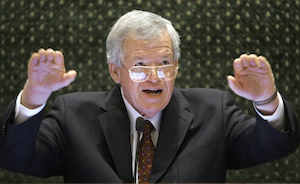Hamilton County last big holdout on tnAchieves tuition program
Thursday, August 15, 2013
NASHVILLE - Hamilton County is now the lone holdout among the state's four biggest counties on a growing program that offers free community college tuition and mentors for soon-to-be high school graduates.
County Mayor Jim Coppinger and Chattanooga Mayor Andy Berke say the tnAchieves program is worth examining. But they also point to their own education initiatives aimed at boosting opportunities for local students.
Earlier this week, Metro Nashville Mayor Karl Dean announced that city was joining tnAchieves, a nonprofit group created in Knoxville in 2008.
It's a "last dollar" scholarship and mentoring program, providing up to $4,000 to state public high school graduates for community college tuition. Most of the money is donated, but Nashville is kicking off its program with $700,000 in funding over two years.
Officials are aiming at a $1.2 million first-year budget. As part of the program, volunteers serve as mentors to high school students to overcome barriers associated with college access and success.
TnAchieves is now in 27 counties, including Davidson, Knox and Shelby.
Coppinger said Wednesday he noticed Dean's announcement.
"Obviously anytime there's an opportunity to help in education, particularly to help our young people and help strengthen our workforce, I'm interested," he said, adding he plans to sound out the local nonprofit community and potential donors.
But Coppinger said Hamilton, Bradley, Marion and McMinn counties are banding together to create Southeast Tennessee Pathways to Prosperity. That program focuses on getting high school graduates ready for local jobs by preparing them for advanced manufacturing and information technology careers. Schools hope to roll it out a year from now, he said.
"It gives our young people an opportunity to take a direction that may lead to college, a four-year school or certifications," Coppinger said. "We are doing some things, but I'm interested in tnAchieves as well."
Berke, a former state senator who took office in April, said he had worked in the Legislature on ways to promote state efforts aimed at getting students to attend and complete college.
Hamilton County government operates the schools, but Berke said his administration has put renewed emphasis on education and youth development.
"We've focused on [ages] 'zero to 5' and up to the time we are preparing our kids to go to college. In the budget there is funding for education programs in the city as well as a mentorship program designed, in part, to help kids go to college," he said.
Berke's proposed budget calls for turning city recreation centers into youth development centers offering academic tutoring. It also provides funding for an internship program for low-income students, pairing children with mentors for "life and academic coaching to give them access to both economic and academic opportunity."
"I certainly agree with the principles involved in tnAchieves and am willing to look at the program itself," Berke said.
In an interview this week, tnAchieves Executive Director Krissy DeAlejandro said the group has met with Hamilton County officials but "just can't get any traction there."
"But we're still hopeful," she said.
Coppinger said he didn't recall ever meeting with the group. Berke said he spoke with officials while he was serving in the Legislature.
Pete Cooper is president of the Community Foundation of Greater Chattanooga, which he said provides some 350 students with nearly $1 million in college scholarships. Cooper recalled speaking with the tnAchieves group in the past.
"Let me start by saying that college scholarships are a huge need, especially with low-income populations even though we have things like [federal] Pell grants and Hope [lottery-funded] scholarships," Cooper said.
The Community Foundation is the city's largest nongovernmental provider of scholarships and funds many other programs in K-12 education and elsewhere, Cooper said.
But college affordability is one part of a two-sided problem Cooper sees as blocking access to college locally. And in Chattanooga, you can't ignore the second factor, he added.
"The problem with scholarships is that they offer hope to those kids that by the end of high school are college material. It doesn't help kids that are dropping out in the 10th grade," Cooper said.
"If we're going to really change the workforce in this city we have to provide scholarships -- but also provide other things for kids to finish high school."
Chattanooga State President Jim Catanzaro said he is working with DeAlejandro and with Randy Boyd, a Knoxville businessman who helped start Knoxville's program, about drumming up private support for such a program locally.
Boyd, now a special adviser to Gov. Bill Haslam on higher education, is the "spearhead of this whole whole movement of putting private philanthropic support for scholarships," Catanzaro said. "Things aren't done overnight at this level."
But, Catanzaro said, "We're in hot pursuit."
Contact staff writer Andy Sher at asher@timesfreepress.com or 615-255-0550.


